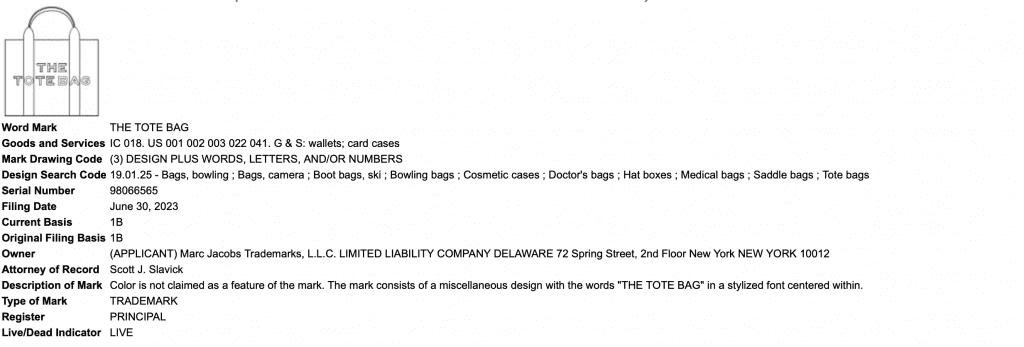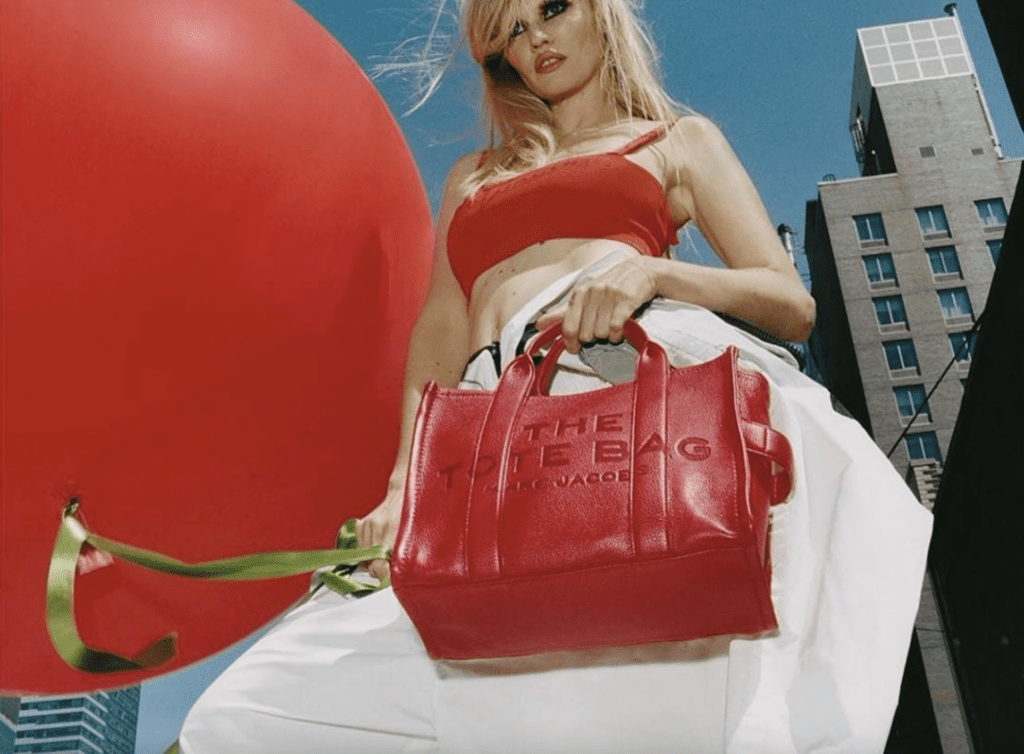Marc Jacobs is looking to escape a lawsuit accusing it of “intentionally and knowingly” making “fraudulent” trademark infringement assertions with the aim of getting Amazon to remove a third-party seller’s listings of bags that closely mirror its viral TOTE BAG bags. In a motion to dismiss filed on February 12, Marc Jacobs urges a New York federal court to toss out Guangzhou Xia Ling Wan Trading Co., Ltd. (“Guangzhou”)’s case, arguing that the Chinese company has had two opportunities to cure “the defects in its original complaint,” including its failure to plead claims for tortious interference, but failed to do so. As such, Marc Jacobs is seeking dismissal of the lawsuit in its entirety.
Some Background: China-based Guangzhou filed a lawsuit against Marc Jacobs in November, alleging that in order to lodge a trademark-centric complaint with Amazon about the “infringing” bags at issue, Marc Jacobs relies on two intent-to-use trademark applications for THE TOTE BAG word mark and a figurative mark for use on “wallets and card cases.” Guangzhou asserts that Marc Jacobs “knows that if it applied for THE TOTE BAG for tote bags, it would get a strong genericness refusal from the U.S. Patent and Trademark Office,” and yet, it “still decided to use these two pending-review marks” to successfully file a complaint with Amazon, which ended up delisting the lookalike tote bags.

Against that background, Guangzhou has sought a declaration from the court that it is “not infringing, has not infringed, and is not liable for infringing” Marc Jacobs’ “pending-review” THE TOTE BAG marks. It has set out a tortious interference with contractual relations and tortious interference with prospective economic advantage claims as a result of Jacobs’ “fraudulent assertions of trademark infringement.” And most recently, in an amended complaint filed on January 28, Guangzhou added a trade libel claim to the case on the basis that Marc Jacobs “was aware that it lacked trademark protection for its [THE TOTE BAG] trademark under the category of tote bags, as it was limited to wallets and card cases, [but] chose to inform Amazon that [Guangzhou’s] Tote Bag infringed upon [its] trademark” anyway.
Fast forward to February 12 and the LVMH-owned fashion brand is looking to shake the case, arguing that Guangzhou has failed to sufficiently plead its tortious interference and trade libel claims. Specifically, Marc Jacobs asserts …
Tortious Interference with Contractual Relations – Marc Jacobs claims that Guangzhou does not allege the facts necessary to support four of the five elements of a tortious interference with contractual relations claim. Most fundamentally, Guangzhou fails to plausibly allege that Marc Jacobs “intentionally procured a breach of its supposed contract with [Amazon] ‘without justification’” by filing a trademark infringement report with Amazon because “as a matter of law, good faith efforts to enforce one’s own trademark and common law trade dress rights through non-judicial means … do not constitute tortious interference,” counsel for the fashion brand contends. (Jacobs contends that “courts in this District frequently dismiss similar claims because Amazon does not breach its agreements with sellers by exercising its discretion to remove product listings.”)
Beyond that, Marc Jacobs argues that aside from the pending trademark applications for registration, Guangzhou “does not even begin to grapple with” its common law trade dress rights that “also protect its recognizable design,” which “also undermine[s] any suggestion of fraud.” Indeed, Jacobs contends that “one glimpse at the parties’ products and Jacobs’ trademark application forecloses any notion that Jacobs ‘knew’ it had no trademark rights in its bags.”

As for the terms of its contract with Amazon and how Amazon breached that agreement, Marc Jacobs claims that Guangzhou has provided only the title of the agreement, a “pleading defect[that] is not a mistake, but a vexatious strategy to … conceal from the court proof that its claim can never be sustained,” warranting dismissal of the lawsuit with prejudice.
Tortious Interference with Prospective Economic Advantage – Marc Jacobs argues that Guangzhou similarly fails to allege all of the necessary elements of a tortious interference with prospective economic advantage claim. Specifically, Marc Jacobs maintains that Guangzhou has not plausibly alleged that it acted solely out of malice or used wrongful means. In fact, Marc Jacobs asserts that by alleging that it “acted in its own economic self-interest, Guangzhou has doomed its claim.” In short: “Marc Jacobs’ effort to protect its valuable brand and intellectual property rights in this iconic design is obviously rooted in its own interests, rather than any malice toward Guangzhou.”
Among other things, Guangzhou’s effort to satisfy the “wrongful means” prong also fails, as while Guangzhou alleges that Marc Jacobs acted wrongfully in enforcing its trademark rights by submitting a report to Amazon, its claim falls short, per Jacobs. “If accepted, any attempt to enforce intellectual property rights would result in collateral litigation over tort claims, chilling the enforcement of basic rights,” which is why “courts have repeatedly invoked this principle to dismiss tortious interference with business relations claims predicated, as here, on ordinary trademark enforcement efforts.”
In terms of harm to Guangzhou’s relationship with Amazon, Marc Jacobs argues that Guangzhou makes only the bare conclusion that Jacobs caused “Amazon to reduce [its] sales offerings,” “reduc[e] the visibility and exposure of [its]’s products,” and “downgrade the status of [its] entire account.” (Jacobs asserts earlier in its motion that as a result of its report, Amazon disabled the links to “just three bags sold in Guangzhou’s store.”)
Trade Libel – Turning to Guangzhou’s trade libel claim, Marc Jacobs states that this new claim is “equally meritless,” as it fails to meet basic pleading requirements for asserting “special damages” and malice. (Jacobs argues that “mere efforts to enforce one’s own trademark and trade dress rights, including through takedown notices, cannot establish ‘malice.’”) But “most importantly, and incurably,” Jacobs maintains that “asserting that a company’s goods infringe trademark rights does not impugn the ‘quality or condition’ of the goods themselves, and therefore cannot sustain a claim for trade libel.” Because “no additional allegations could cure this defect, dismissal with prejudice is warranted,” the brand states.
Declaratory Judgment – Finally, Jacobs urges that with the dismissal of Guangzhou’s tort claims, the court to “exercise its statutory discretion” to decline jurisdiction over Guangzhou’s only other claim: a declaratory judgment of non-infringement. In a nutshell, Jacobs argues that “Guangzhou admits that Marc Jacobs has relevant trademark applications pending in the U.S. Patent and Trademark Office and recognizes that Amazon has its own reactivation policies, but by this action seeks wrongfully to disrupt those regular administrative and company processes. [These] circumstances do not warrant the Court’s discretionary exercise of jurisdiction.”
And in a “fun” final takeaway (as first reported by TFL) … It appears that in October 2023 (just before filing its lawsuit against Marc Jacobs), Guangzhou filed a trademark application for registration of its own with the U.S. Patent and Trademark Office for the identical THE TOTE BAG mark (consisting of “a bag imprinted with a standard character of ‘THE TOTE BAG'”) as Marc Jacobs. The application is currently awaiting examination by the USPTO.
The case is Guangzhou Xiao Ling Wan Trading Co. Ltd. v. Marc Jacobs Trademarks LLC, 1:23-cv-09975 (SDNY).
Updated
July 15, 2024
The parties filed a STIPULATION OF VOLUNTARY DISMISSAL. “It is hereby stipulated and agreed by and between the parties and/or their respective counsel(s) that the above-captioned action is voluntarily dismissed, with prejudice against the defendant(s) Guangzhou Xiao Ling Wan Trading Co., Ltd pursuant to Rule 41(a)(1)(A)(ii) of the Federal Rules of Civil Procedure. Document filed by Marc Jacobs Trademarks LLC. Proposed document to be reviewed and processed by Clerk’s Office staff (No action required by chambers).”











